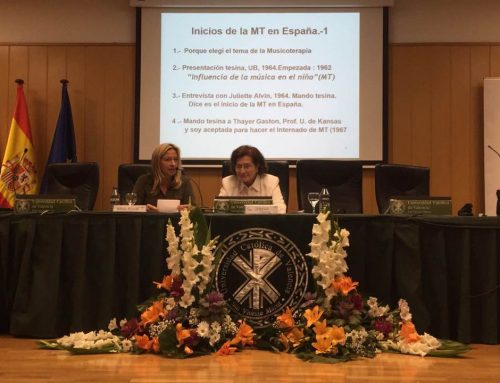First of all, thank you very much for wanting to be on our blog. It is a preasure to “listen” to such an experienced music therapist and a luxury to interview the current president of WFMT.
We want to start this conversation by asking you did you find music therapy or music therapy found you?
I would say that we mutually found each other. Music has been part of my whole life having been born and grown in a family of musicians. I started studying music at a very early age and then, at the age of 18, I started studying Psychology at the university. So, music therapy was a natural and perfect profession for me since it allowed me to combine these two vocations and passions: music and therapy.
Looking at your extensive training, we see that she has a degree in Psichology, you have superior flute studies, a PhD in music education from the University of Oregon (USA), a master in music therapy from Florida State University (USA), specializing in Dementias by the National Health Institute (USA).
Later, you also worked as a music therapy teacher at the University of Willamette (Oregon, USA). How is the learning environment in the United States music therapy?
Music therapy programs have been part of the educational options in many American universities since 1944. Most of the music therapy programs are housed in music schools, and they offer programs at the Bachelor, Master and Doctoral levels. The curriculums are very well established and meet the standards of the American Music Therapy Association with very clear competencies students need to meet. They have a very balanced combination of theoretical and practical courses.
Since there are many professional music therapists (around 6.000) working in a variety of institutions and diverse populations around the USA, the possibilities of doing practica next to a professional music therapist is a given. In addition, the training in music theray in the usa requires a 6 month full time internship which entails working under the supervision of a professional music therapist.
The music therapy programs have a good number of students and it is a wonderful place to meet other people with the same interests and to learn from them.
In Spain you also have a wide experience as a teacher, for example, director of Master in the Esmuc or professor in the UNIR and other training programs in music therapy (UAM,UPSA). Indeed, recently you are also the new academic director of the Esmuc, the high School of Music of Catalonia,congratulations!
How do you see the Spanish formative panorama in music therapy?
The positive aspect is that there are several music therapy programs which are offered in universities and one which is housed in a Music school. All these are post-graduate programs, most of them 1-2 years long master programs. These programs are short considering the traning music therapists need. However, they allow students to achieve a minimum of competencies to enter the professional field. Another positive aspect of this offer is that there are choices for people interested in studying music therapy in Spain. On the other hand, although there are guidelines music therapy programs should meet, these are not still enforced nor monitored by a higher professional body. This means that there are some trainings that not meet international standards.
How do you see the recognition of the effectiveness of music therapy in Spain, in sectors such as health or education?
Music therapy is currently present in many health and educational institutions. This means that people progressively understands and ackowledges the benefits of of music and how music therapists can contribute to people’s health and wellbeing. However, since there is not a specific professional profile for music therapists, defined and recognized by government authorities, many music therapists in Spain get positions under other professional designations (e.g. teachers, psychologists), and work in music therapy projects instead of having full time music therapy jobs in these institutions.
You have done a lot of research and have published many works at both the national and international levels. What research topics are most needed today? And where is more research done?
There are many topics which are important to research in order to understand more deeply how music therapy can contribute to people’s health and wellbeing. There is a lot of research still needed with certain populations: Cerebral palsy, ADHD, non-Alzheimer dementias, different types of cancer, Down’s syndrome……. In addition, the field needs much more research to understand more deeply how music effects people, why we observe certain changes on people……
North American (USA and Canada) , Australia, the UK and the Nordic countries (especially Denmark and Norway) are very productive in research. Korea and Japan are also coming along. But, I woulld like to emphasize that all countries acknowledge the importance of research to help in the advancement, and recognition of the field.
What projects does the WFMT for this 2019?
Each of the 7 commissions of the WFMT have specific projects they are working on to contribute to the development of the music therapy profession around the globe. Some of the projects are the following:
-
Raise global awarenes about music therapy (World Music Therapy Day: March 1, 2019)
-
Knowing and understanding the different standards in training in the 8 different regions of the WFMT
-
Studying the possibility of a global certification for music therapists
-
Helping to desing and carry out research projects around the globe
-
To foster international collaboration of music therapists
-
The preparation of the XVIth World Congress in Music Therapy which will take place in July of 2020 in South Africa.
Several regional parliaments such as País Valencià, Aragón and the Balearic Islands have defended the recognititon of music therapy as a profession. Do you think it is far from being a reality in our country? Where is music therapy in Spain envolving?
Yes, and these are wonderful steps toward the recognition and regulation of the profession in Spain. A big step for Spanish music therapists, which I believe is crucial, would be to achieve to speak in a unified voice as a professional group and to be able to work together to achieve this recognition sooner. It’s important that music therapists in the different communities present similar proposals to their autonomic parliaments.
Music therapy in Spain is making good moves in medical hospitals and community contexts.
Thank you very much Dr. Melissa Mercadal-Brotons for spending some of your time answering our questions.

1st Mediterranean MT meeting

Exchange between MT Esmuc and WVU (USA) program

Meeting chairmen AEMTA-EMTC





